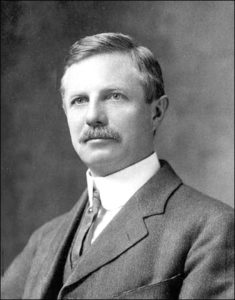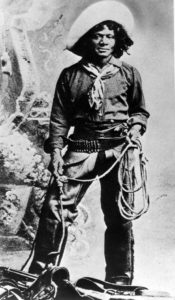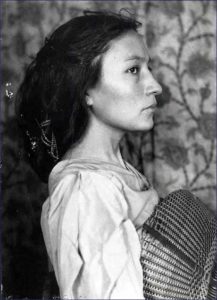As emigrants moved into the American West, it is evident that they carried with them the tenets of racism and white supremacy, and these became a component of the American identity. Anyone aware of early American history should know that white supremacy was built into the US Consititution. A compromise which defined African slaves as three-fifths of a person for electoral reasons asserted a fundamental inequality of people with African heritage. Of course, slaves may have been counted to apportion delegates in Congress, but they would not be allowed to vote until after the Civil War. In most states, voting rights were limited to white property owners. As lower class whites began to demand more from the society, wealth was dropped as a prerequisite for voting, but the race and gender requirements remained. The idea of whiteness itself was not firmly defined, and for a time could have been construed as excluding Italians and Irish, but the distinction was especially effective in excluding people of African descent. Indians in most cases were completely excluded from any consideration of rights, and later Chinese people also suffered the unequal protection of the law and exclusion from the same rights as white people. Although in many ways the frontier provided better opportunities for some non-white people, for the most part the best opportunities were reserved for white people, and an assumption of white superiority was promoted throughout the culture.

While he waxes poetic about the role of the American Frontier in shaping the identity of European Americans, concepts of white supremacy are interspersed throughout Frederick Jackson Turner’s essay, The Significance of the Frontier in American History. The reference to the large bulk of the continent, the frontier of European development, as “free land” dismisses out of hand the humanity of the Indians who inhabited that land and their claim to its ownership. Turner seems to be completely unsympathetic to the fact that the “log cabin of the Cherokee and Iroquois” was previously inhabited by human beings who were murdered, and that as his prototypical emigrant becomes less European and more American, he is in fact becoming more like an Indian. When a white man adopts Indian practices, this enhances his value and should be celebrated, but when an Indian adopts the white man’s ways, although his or her character may be enhanced, he or she is still not perceived as being fully equal. Another characterization is that Indian lands were “won” in a series of wars, which stands in contrast to the earlier assertion that the lands were “free.” Turner is similarly dismissive to the effect of African slavery on the character of the American identity. He refers to the systematic, centuries-long practice of depriving generations of Africans their human rights to exploit their labor and life energy as “incident,” and anyway, it was frontiersman Lincoln who put an end to the practice. Turner celebrates the civilizing force of laws and public policies, and then without any sense of irony, applauds Burke’s flouting of the legitimacy of land grants and his scoffing at leaving “savages to enjoy their deserts in quiet.” Only by purposely confusing terms could this be interpreted as a suggestion that Indians “deserved” anything.
Although former slave Nat Love’s account of his experiences as a cowboy in The Life and Adventures of Nat Love might seem to suggest there was an opportunity to escape white supremacy in the West, the degree of opportunity was shallow and fleeting. The obvious expression of white supremacy in Love’s life is that he was born a slave. He clearly states his views:
Wealth was created, commerce carried on, cities built, and the new world well started on the career that has led to its present greatness and standing in the world of nations. All this was accomplished by the sweat of the black man’s brow…. the boast of every white man and woman, with a drop of southern blood in their veins, and what did the black man get in return? His keep and care you say? … we did it because we were forced to do it by the dominant race.

While Nat Love himself certainly did not view himself as an inferior sort of person, and indeed the experiences he relates and the literacy which he displays in his writing reveal him to have been above average in intellect and stamina. Although the tough cowboy work offered a sort of equality to the hearty men of different races who were drawn to it, the cattle barons and land owners would have still been predominantly white. We have learned that there were a similar percentage of Mexicans who worked as cowboys in this period, but Love only describes his compatriots as being colored or white. He also says that he had “fought Indians and Mexicans in all sorts of situations,” even though he describes “Indian thiefs and the white desperadoes who infested the cattle country.” In one of his stories, he tells a tale of riding his horse into a Mexican saloon and killing several men. Love’s expression of disdain for Mexicans and Indians, to the point that he openly brags about having murdered some, can be interpreted as an attempt to adopt the prejudices of the white majority in order to inure himself more with them and be accepted more into the predominant culture. By labeling Indians and Mexicans as less worthy, he feeds into the idea of a continuum in which whites are the superior race. Certainly, since whites were the audience that would buy his book, this can be interpreted as a strategy for personal success, even if it had the additional impact of reinforcing white supremacist attitudes.
The assertion of the supremacy of European culture is also evident in the account of Zitkala-Sa, American Indian Stories. As a young girl, she

imagines the whites to be superior with all their technology and large red apples, even though her mother tells her “the paleface has stolen our lands and driven us hither.” As she goes on the train to the Indian school, she learns from the rudeness of the white children and their mothers that whites do not consider her worthy of simple respect. It was not enough for the school to teach the Indian children English and cultural norms. The purpose was also to destroy the Native elements of the student’s personality. By cutting their hair and removing their regular clothing, the school began to demolish the identities of the young children. As Zitkala-Sa puts it, they were “inculcating in our hearts [their] superstitious ideas.” Even as she excelled in school and triumphed in the oration competition, she had to endure taunts of racism and watch as a flag was unfurled with the epithet “squaw” printed on it. It is interesting to note that although Zitkala-Sa’s father was white, she was raised as a Lakota and her whiteness does not impact upon the perception of her as Indian. The custom which ignores her white heritage is similar to the practice of considering a person with one-eighth measure of African descent to be an “octaroon” and therefore still African.
In Mae Ngai’s book, The Lucky Ones, white supremacy is evident in the treatment of the Tape family throughout their lives in the San Francisco Bay Area. Although both Joe and Mary Tape had no connection to China, both were seen as “native” Chinese to their white neighbors. Mary argued to the school board that her daughter, Mamie was in fact a white girl and only Chinese “in features.” Mary herself strongly identified with white culture, having been rescued from slavery as a girl and raised in the Presbyterian Lady’s Society. As the era of Chinese Exclusion Act commenced, Joe Tape and his family found themselves in a position to profit from their rare condition as fully-acculturated Americans who were ethnically Chinese through Joe’s drayage company and various interpreter and government functions. They adopted white hobbies, wore European-style clothing, and moved as far away from Chinatown as possible in order to further accentuate their Americanness. Chinese people were stereotyped as being people of low character even as they were recognized as hard-working. It seems that the main reason Chinese people received so much grief is because they were competing for labor with white people, and those white people were able to promote racial superiority to disenfranchise them.
White racial superiority was there at the beginning of this nation, and proliferated throughout the country as European-based society expanded west. Race and slavery played a role in which states were admitted to the Union and when, and even where railroads would be placed and along with them which towns would flourish. After Chinese people flocked to the American west to work on the railroad, they were soon pushed out as soon as it was complete. Even though a war was waged to grant Africans freedom from slavery, they were left the lowest, hardest jobs and still faced rampant prejudice and persecution. American Indians were barely recognized to be human beings, even as their traditions and practices were co-opted as part of what it means to be American.
Matthew Ebert
HIST 417 – 1001
Professor Lezotte
17 February, 2017
NOTE: I ended up rushing this to submit it on time, and so did not pay as much attention to transitions as I might have. Also, I wanted to point out how the people I cite– Nat Love, Zitkala-Sa, Joe Tape– had to be extremely exceptional people in order to be granted their notoriety. Nat Love was an incredibly adept writer in addition to having done all the amazing things he recounts. Zitkala-Sa was very beautiful and a talented writer, orator, and musician. Joe Tape and his wife Mary worked incredibly hard and immersed completely in white culture in order to achieve their middle-class success.
